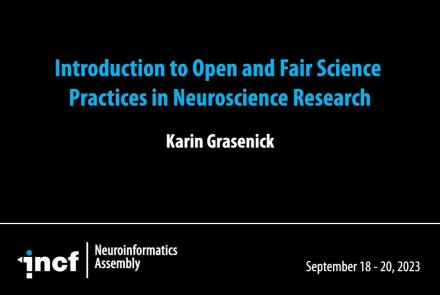Lesson type
Difficulty level
In this lesson, you will learn about neurotransmitter release in the presynaptic specialization.
Difficulty level: Beginner
Duration: 21:36
Speaker: : Carl Petersen
This lesson covers synaptic modulation through diffusing neurotransmitters.
Difficulty level: Beginner
Duration: 23:00
Speaker: : Carl Petersen
This lecture gives an overview of glutamatergic transmission.
Difficulty level: Beginner
Duration: 28:53
Speaker: : Carl Petersen
This lesson discusses glutamate release after an action potential, and the resulting post-synaptic potentials.
Difficulty level: Beginner
Duration: 29:35
Speaker: : Carl Petersen
In this lesson, you will learn about glutamatergic excitatory neuronal circuits.
Difficulty level: Beginner
Duration: 28:36
Speaker: : Carl Petersen
This lesson gives an overview of neurons' dendritic spines and their function.
Difficulty level: Beginner
Duration: 21:31
Speaker: : Carl Petersen
This lecture provides an introduction GABAergic inhibition and its receptors.
Difficulty level: Beginner
Duration: 25:18
Speaker: : Carl Petersen
This lesson takes a closer look at GABA_A receptor mediated fast inhibition.
Difficulty level: Beginner
Duration: 18:51
Speaker: : Carl Petersen
This lecture focuses on how benzodiazepines act on GABA_A receptors.
Difficulty level: Beginner
Duration: 14:05
Speaker: : Carl Petersen
This lesson discusses long-range inhibitory connections in the brain, with examples from three different systems.
Difficulty level: Beginner
Duration: 19:05
Speaker: : Carl Petersen
In this lesson, you will learn about GABAergic interneurons and local inhibition on the circuit level.
Difficulty level: Beginner
Duration: 16:27
Speaker: : Carl Petersen
This is the first of two workshops on reproducibility in science, during which participants are introduced to concepts of FAIR and open science. After discussing the definition of and need for FAIR science, participants are walked through tutorials on installing and using Github and Docker, the powerful, open-source tools for versioning and publishing code and software, respectively.
Difficulty level: Intermediate
Duration: 1:20:58
Speaker: : Erin Dickie and Sejal Patel
This lesson contains both a lecture and a tutorial component. The lecture (0:00-20:03 of YouTube video) discusses both the need for intersectional approaches in healthcare as well as the impact of neglecting intersectionality in patient populations. The lecture is followed by a practical tutorial in both Python and R on how to assess intersectional bias in datasets. Links to relevant code and data are found below.
Difficulty level: Beginner
Duration: 52:26
This is a hands-on tutorial on PLINK, the open source whole genome association analysis toolset. The aims of this tutorial are to teach users how to perform basic quality control on genetic datasets, as well as to identify and understand GWAS summary statistics.
Difficulty level: Intermediate
Duration: 1:27:18
Speaker: : Dan Felsky
This is a tutorial on using the open-source software PRSice to calculate a set of polygenic risk scores (PRS) for a study sample. Users will also learn how to read PRS into R, visualize distributions, and perform basic association analyses.
Difficulty level: Intermediate
Duration: 1:53:34
Speaker: : Dan Felsky
Course:
Maximize Your Research With Cloud Workspaces is a talk aimed at researchers who are looking for innovative ways to set up and execute their life science data analyses in a collaborative, extensible, open-source cloud environment. This panel discussion is brought to you by MetaCell and scientists from leading universities who share their experiences of advanced analysis and collaborative learning through the Cloud.
Difficulty level: Beginner
Duration: 55:43
This talk enumerates the challenges regarding data accessibility and reusability inherent in the current scientific publication system, and discusses novel approaches to these challenges, such as the EBRAINS Live Papers platform.
Difficulty level: Beginner
Duration: 18:08
Speaker: : Andrew Davison
In this lesson, you will learn about how team science unfolds in practice, as well as what are the standards and best practices used by teams, and how well these best practices function and support scientific output.
Difficulty level: Beginner
Duration: 15:21
Speaker: : Hannah Bayer
In this lesson, you will learn about approaches to make the field of neuroscience more open and fair, particularly regarding the integration of equality, diversity, and inclusion (EDI) as guiding principles for team collaboration.
Difficulty level: Beginner
Duration: 14:11
Speaker: : Karin Grasenick
This lesson discusses the topic of credit and contribution in open and FAIR neuroscience, looking through the respective lenses of systems, teams, and people.
Difficulty level: Beginner
Duration: 24:34
Speaker: : Tanya Brown
Topics
- Artificial Intelligence (7)
- Philosophy of Science (5)
- Provenance (3)
- protein-protein interactions (1)
- Extracellular signaling (1)
- Animal models (8)
- Assembly 2021 (29)
- Brain-hardware interfaces (14)
- Clinical neuroscience (40)
- International Brain Initiative (2)
- Repositories and science gateways (11)
- Resources (6)
- General neuroscience
(62)
- Neuroscience (11)
- Cognitive Science (7)
- Cell signaling (6)
- Brain networks (11)
- Glia (1)
- Electrophysiology (41)
- Learning and memory (5)
- Neuroanatomy (24)
- Neurobiology (16)
- Neurodegeneration (1)
- Neuroimmunology (1)
- Neural networks (15)
- (-) Neurophysiology (27)
- Neuropharmacology (2)
- Neuronal plasticity (16)
- Synaptic plasticity (4)
- Visual system (12)
- Phenome (1)
- General neuroinformatics
(27)
- Computational neuroscience (279)
- Statistics (7)
- Computer Science (21)
- Genomics (34)
- Data science
(34)
- (-) Open science (61)
- Project management (8)
- Education (4)
- Publishing (4)
- Neuroethics (42)




















